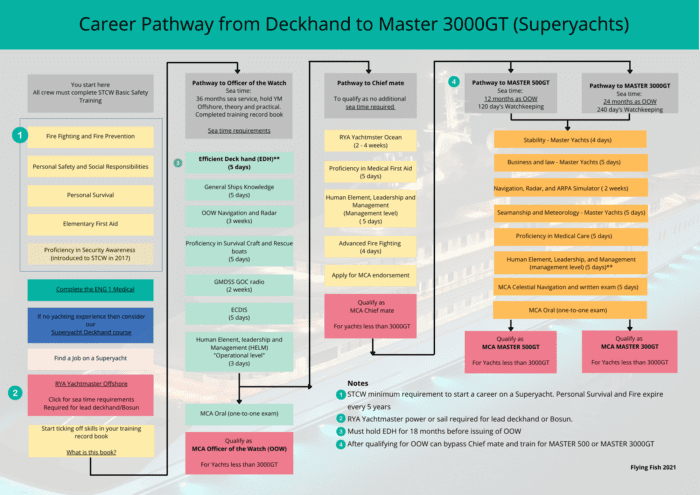
Thinking about becoming a Deckhand on a Superyacht and want to know whether this could be a career for you? You’re in the right place.
The role as a Deckhand is often the first entry level step into an exciting career at sea. It’s a hand’s on, physical role that requires you to keep the exterior of the yacht meticulously clean and kept in pristine condition at all times. Deckhands also tend to help guests enjoy their time on the water, which could be launching jet skis, driving tender boats, or setting up inflatable toys. You’ll be involved in both guest service and the upkeep of the yacht’s water toys and equipment.
Working as a Superyacht Deckhand is an exciting and rewarding career that will see you travel across the globe, make amazing new friends and gain a plethora of new skills and experiences!
If you’re hardworking, enjoy the outdoors and want a job that’s far from ordinary, this could be your ideal path. Whether you have prior sailing or yachting experience or none at all, we will walk you through exactly how to get started.
What qualifications do I need to be a Deckhand?
here are three areas to consider when it comes to qualifications and experience. The first two are mandatory, the third depends on you, what work experience you have or job you have been doing to date.
-
- ENG 1 medical required by all crew who work at sea. If you are thinking of becoming a Superyacht Deckhand we recommend you complete the ENG1 medical before completing Step 2.
-
- STCW Basic Safety Training is a set of compulsory safety qualifications required by all crew in case there is an emergency onboard. STCW is a six-day course comprising; sea survival, first aid, fire fighting (great fun), and health, safety, and security.
-
- Get some experience we will explain more below but you don’t have to come from a yachting background to work on a Superyacht. However, it does help if you know the basics. Yachts want to see that you have a good work ethic, like the outdoors, and can get on with people. If you have a background in; hospitality, Engineering, Carpentry, Electrician, Water sports instructor, Divemaster, to name a few, then this will look great on your CV.
It is true that for any new job, the more experience and skills you can offer the better. So, if you are new to yachting and want to get qualified before heading off, we can help you get started.
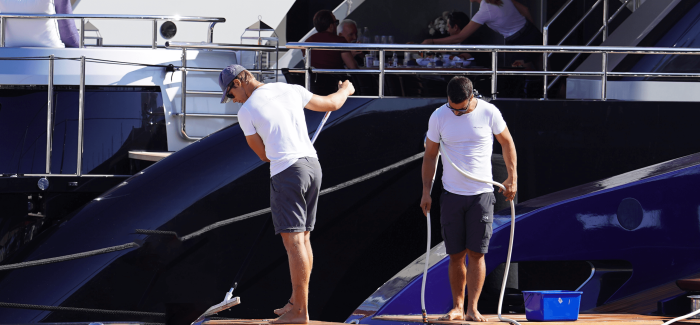
How do I become a Deckhand with no experience?
You don’t need to be a Yachtmaster or have worked on a yacht to become a Deckhand on a Superyacht. Most Superyacht crews don’t come from a boating background. Once onboard, the yacht’s crew will show you the ropes and what is expected.
However, any experience in water sports, diving, or on boats will help. Don’t worry if you haven’t worked in a practical role or been on boats.
Apart from the compulsory qualifications mentioned above, what is common among all crew is the desire to work outdoors in the sunshine.
What all Superyachts look for is a good attitude, a desire to work hard, and to be part of a team. If you have a good, positive attitude, then you can go far. Flying Fish can provide all the qualifications and skills you need to get going; all we ask is for you to provide bring a good work ethic and a positive attitude.
To understand the experience and qualifications you need to get started, you can either contact us or download our guide.
We’ve simplified the journey, breaking down the key steps to help you land your first job in this incredible industry. Your future starts now—let’s make it happen!
What does a Deckhand actually do?
Well, that’s hard to explain in just one article! All crew work, eat and sleep onboard, the yacht will become your home, the crew your family.
The yacht will look after you, the chef cooks all your meals while onboard. Your contract will specify your duties, salary, working hours, and holiday entitlement. The yacht will supply your uniform and provide further training if necessary.
The role of a Deckhand will vary from yacht to yacht, depending on the size, how many crew, whether it is private or charter, the owner, Captain, and many other factors. However, the deck team’s main role is the cleaning and maintenance of the exterior of the yacht and its toys.
You will be tasked with washing the yacht, cleaning the windows, scrubbing the teak decks, and polishing the stainless. When the guests are onboard you may drive the tenders, and jet-skis, help with water sports activities, and even time in the bridge on lookout duties.
What is a typical working day like as a Deckhand?
Your working day will typically start at 8:00am and finish at 6:00pm, usually six days a week. When on charter, or if the owners are onboard, your work hours will differ. Unsociable hours are common when guests are on board.
Do I live on board?
You will share a cabin with another Deckhand. The cabins are small but comfortable, with an ensuite bathroom. There is access to the internet via that yacht’s Wifi system, so you can keep in touch with friends and family at home.
How do I find work on a Superyacht?
There are three ways crew can find a job:
-
- Most crew travel to Antibes, France, described as the hub of yachting in the Mediterranean. The Med season runs from March through to October.
-
- Online, we talk a bit more about “going online” below.
-
- Contacts. If you know somebody already working on a Superyacht, then it is possible to find work through their connections.
Almost everybody that is looking for a job on a Superyacht travels to Antibes, France. On arrival, crew tend to stay in a crew house, such as the Crew Grapevine used as a base to look for work.
If budget is a concern, then crew join forces and rent an Airbnb between them. The advantage of a crew house like the Crew Grapevine is that the owners (ex-yachties) actively help you find a job.
The way you find a job on a Superyacht is quite unique. From your base in Antibes, you would travel to other ports in the local area, walk the dock and chat with the crew working onboard to see if any positions are available.
Superyacht crew who have the evening off will go to the local bars to unwind. This is the perfect chance to get to know people working on Superyachts and build connections in the industry.
Go online to look for a work
All Superyacht recruitment agents post positions on their respective websites. Once qualified, new, or “green crew”, as they are known, would register with the agency and complete their registration form. You would then get in touch with the agent to start searching for that dream job.
The recruitment agent’s job is to match the right candidate for the job being advertised. There are many recruitments agents out there, we work closely with YPI a Superyacht recruitment agency based in the South of France.
A quick Google search for “Superyacht Recruitment Agents” will bring up a list.
Yotspot is a very popular website that matches yachts with quality crew.
Facebook is another medium that yachts use to post jobs. To keep up to date, is it worth joining a couple of the Superyacht Facebook groups. Yacht crew jobs and Palma yacht group are two examples.
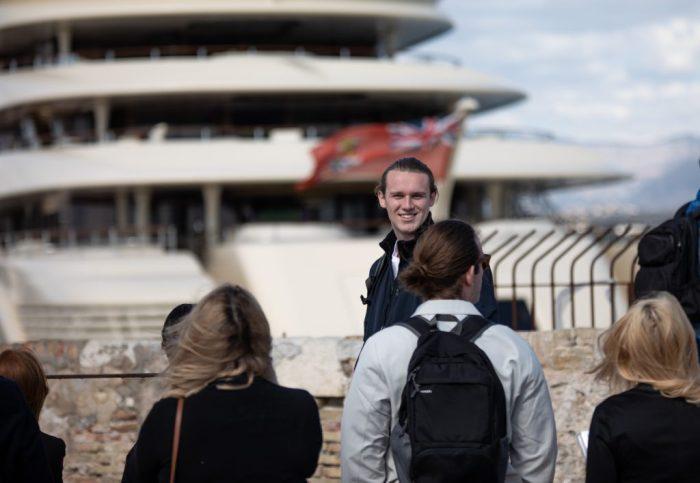
How long does it take to find work on a Superyacht?
Over the 12 years we have been running our Superyacht Deckhand programme, most customers find a job between one and four weeks. We have had customers that have found a job in a day and others that have taken six weeks to find that perfect job.
The time it takes to find a job is down to you. You will need to be proactive, up early, and make sure you are at the front of the queue. From our experience, people who work hard and explore every opportunity will find a job quickly.
Every Captain or Officer that calls us for a reference asks the same question – does the candidate have a good attitude? You need to be hard-working, happy to work long hours, and used to mucking in. Have a can-do attitude and a willingness to go the extra mile to help your fellow crewmates.

When is the best time to look for work on a Superyacht?
Traditionally Superyachts recruit for the Mediterranean season any time between February to May. That being said, yachts recruit all year round. We have seen many graduates find work in July and August when the season is in full swing.
The next key recruitment period is between September and November as yachts prepare for the Caribbean season. Yachts will cross the Atlantic anytime between December and January to cruise the Caribbean or the US for the winter.
Superyacht crew who have had a busy Mediterranean season may decide to take the winter off, which leaves opportunities for new crew to enter the industry.
Can I make yachting a career?
Yes! Thousands of crew who start out as a Deckhand climb the career ladder, first qualifying as a Lead Deckhand, then onto Officer and finally Captain. Okay, that sounds simple, but many have achieved their dream of becoming a Captain of a large Superyacht.
Running a yacht is not easy and requires a lot of qualifications, time at sea, excellent communication and management skills, and a deep understanding of the yachting industry.
Below is the career pathway from Deckhand to Master (Captain). The good news is there is a structured pathway, so you know what skills and sea time are required.
How much does a Deckhand make on a Superyacht?
A Deckhand’s salary ranges between €2,000 to €3,500 a month, though the average is €2,500. Almost all Superyachts pay is in Euros. The salary can depend on many factors, the main one being the yacht’s “crew” budget.
The owner or management company will agree on a budget that the captain uses to hire crew. Each yacht will have a different budget, which can lead to small variations in the amount yachts pay their crew.
Your total salary can also depend on whether you work on a charter or private yacht. On a charter yacht, it is customary for charter guests to tip the crew, the tip is normally around 10% of the charter fee. Chartering a Superyacht can set you back anywhere from €250,000 to €1 million per week.
Tips are split evenly between the crew and on average your tip can be anything from €2,000 – €5,000 for a week’s charter. Tips are paid on top of your monthly salary. Our guide on Superyacht salaries will explain more. Remember, you live onboard the yacht so there are very few living expenses.
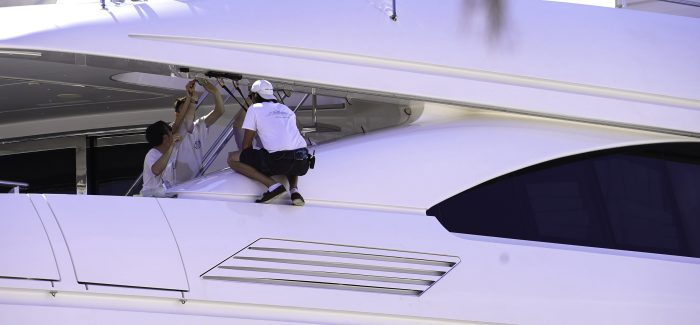
How do I become a Superyacht Deckhand?
This is where we come in. Flying Fish runs a two-week Superyacht Deckhand course that includes all the qualifications and skills you need to get started in the industry. Everything from the STCW Basic Safety Training to a bespoke programme to teach you all you need to know to get started.
The course is great fun, you will learn loads of new skills and meet like-minded people who, like you, are thinking about a different career path.
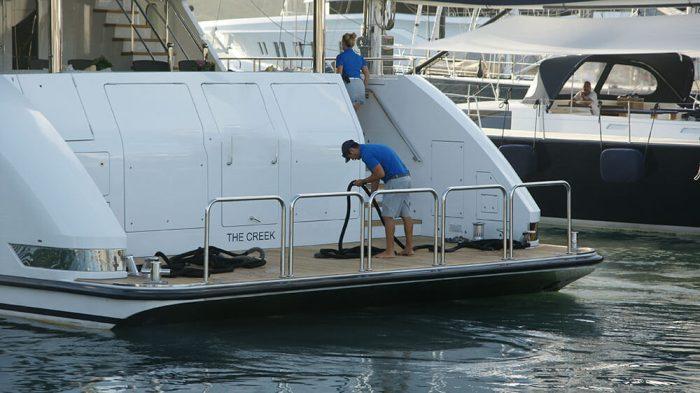
Become a Superyacht Deckhand
If you want to travel the world on a Superyacht, earn an enviable salary and make some incredible friends for life, becoming a Deckhand is the way to go!
The course is suitable for complete beginners or those with experience who are looking to work as a Deckhand on a commercial yacht.
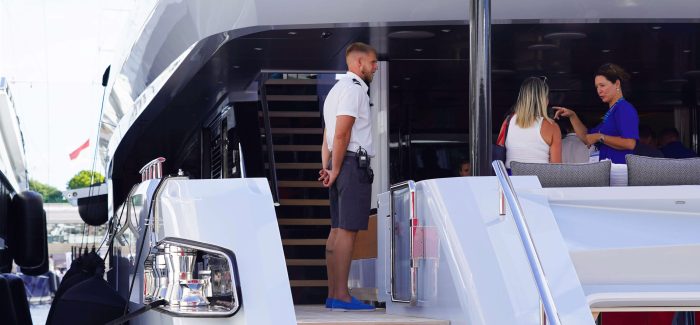
Superyacht Deckhand Course
Our most popular programme, providing everything you need to start your new career. Includes STCW Basic Safety Training.
20 day(s)
From £3,110
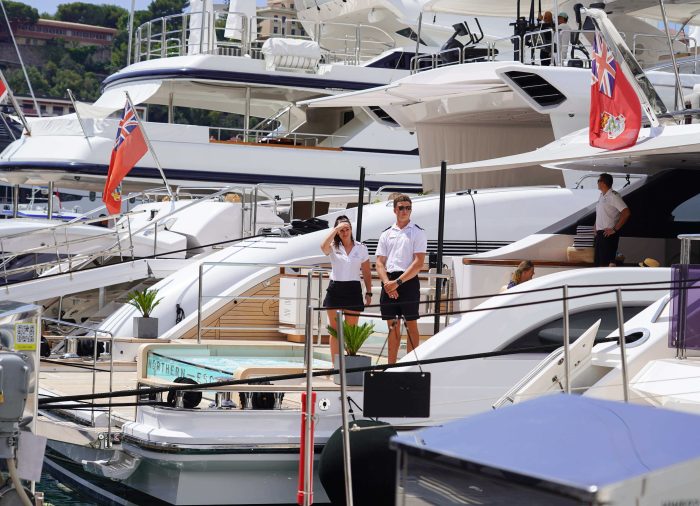
Superyacht Deckhand and Steward/ess Course
Everything you need to apply for a Deck/Stew role.
22 day(s)
From £4,390



